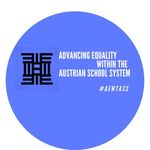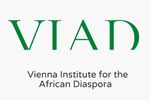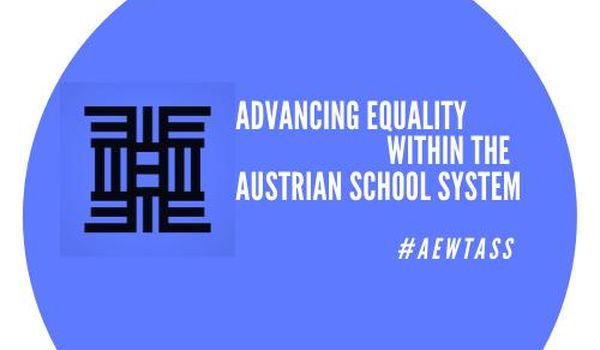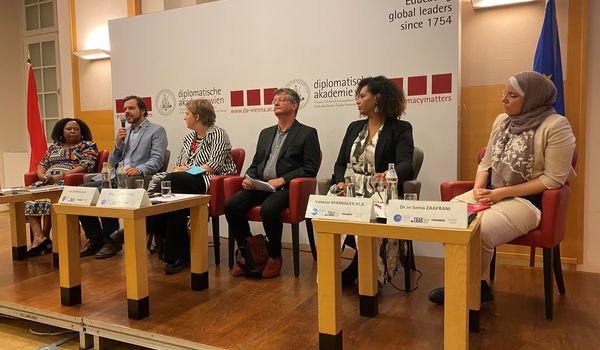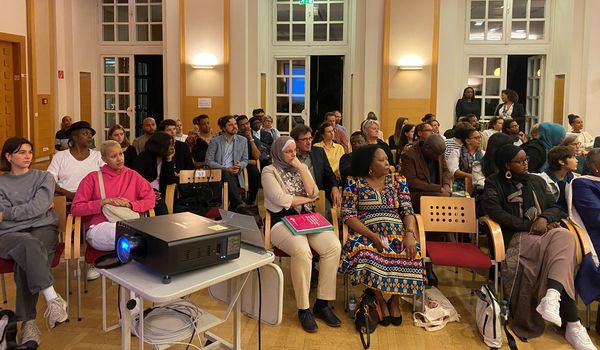Leider liegt der Bericht nur auf Englisch vor
On the 12th of October, the AEWTASS team presented during “Who Speaks for Whom, Volume 4” their findings regarding stereotypical and racist representation of the African continent and people of African descent in the Austrian school system. AEWTASS (Advancing Equality Within the Austrian School System) was established in 2019 to enhance the African continent's depiction within the Austrian school system, to achieve a more nuanced and equitable learning environment. Michael Fanizadeh, the VIDC co-host, welcomed the 120 guests and emphasized the important professional engagement of diaspora initiatives like AEWTASS and the umbrella organisation VIAD, who have limited access to funding for their work.
Ambassador Johnson: Africans need to speak for themselves
H.E. Philbert Isaac Kobina Abaka Johnson, Ambassador of the Republic of Ghana to Austria, delivered the event's keynote speech. He discussed the vitality of education in shaping future generations' perspectives. Johnson stated that “regrettably Africa has often been misrepresented in educational systems worldwide. And where the subject of Africa has been spoken, it is not Africans who speak for themselves…” The narrative of Africa has been told through the European perspective in Austrian school systems. This has perpetuated harmful stereotypes and limited students' knowledge of African culture and history as well as Africa’s role in the development of the European continent. Johnson expressed the importance of removing these harmful stereotypes, as they will affect our future leaders and the relationships they build with African countries. The Ambassador called on the Austrian government to accept this shared responsibility and to guarantee that the African voice is respected and represented. Finally, H.E Philbert Isaac Kobina Abaka Johnson concluded his statement with the following words:
“In conclusion, the Advance of Equality Within the Austrian School System program is not just a program. It is a call to action, a call to reshape perception, inspire future leaders, and transform the world's engagement within the African continent. By challenging and changing the negative stereotypes that persist in the school system we can foster a more informatible and prosperous future for all of us. Let us unite in promoting a more outwardly positive and inclusive image of the African continent. Let us embrace the potential for stronger business and diplomatic relations, people-to-people relations.
Re-imagining Africa - a didactic strategy fostered by critical thinking
Preceding the Ambassador's remarks, the AEWTASS team presented their findings and analysis in a presentation. The first section was given by the “((Re))-imagining Africa '' working group. Introducing the program, members of this AEWTASS group discussed the lack of reputable knowledge of the African continent within Austrian school systems and how this harms members of the African diaspora community. Addressing this imperative issue, AEWTASS offers a didactic strategy fostered by critical thinking, in which students become agents of their education. AEWTASS also discussed upcoming “Unconscious Bias in Teaching'' workshops, which offer a space for strategizing, learning, and reflection.
Secondly, members of the ((Re))-telling stories group provided important information regarding AEWTASS workshops, designed for students and educators. These workshops provide students and teachers with the necessary tools and resources to deconstruct inaccurate portrayals of the African continent in media and school learning materials. Consequently, attending these workshops will help educators and students better identify racist content as well as biased information.
Re-Reflecting Realities - missing multifaced and positive examples
The ((Re))-Reflecting Realities group then presented their reporting work, analyzing and assessing Austrian textbooks from anti-racist and anti-colonial perspectives to uncover unrepresentative content of the African continent. The ((Re))-Reflecting Realties team found in their assessment of various Austrian textbooks that while efforts for more multifaceted representation were seen in some books, the majority of the analyzed books provided limited positive examples of the African continent. The presenters then explained that they do not deny the existence of problems within regions of Africa however, the lack of positive African representation in school books creates an incomplete and inaccurate picture of the African continent. The team also discovered very little information regarding the African perspective, especially for resistance movements against enslavement. Textbooks also failed to contextualize the Austro-Hungarian role in African colonialism and provided limited information regarding African economic and trade relations before colonization. The presenters then provided multiple examples from Austrian textbooks that supported these conclusions. For instance, many textbooks reproduced discriminatory terms, incorrectly represented African pre-colonial history, or provided visual representations of Africans that reinforced racist stereotypes. Particularly, photos of Africans placed in textbooks provided one-dimensional outlooks on Africa and limited students' comprehensive understanding of the African continent and its multifaceted history. Overall, the AEWTASS presentation concluded that there is an “urgent need for a (more) differentiated presentation of the African continent, countries, and Black people on the African continent and in the diaspora.”
Unadequate and rascist narratives in Austria school textbooks and media
Following the insightful presentation by the AEWTASS team, the event shifted towards a panel discussion. Vanessa Spanbauer, a member of the AEWTASS team, opened the panel with further details about AEWTASS' work and why the organization is so imperative. Vanessa mentioned that “Austria also needs to acknowledge that the image of Africa that the media but also that textbooks and the educational systems portrays is inadequate. It is not the full image.” Vanessa Spanbauer explained that these issues not only affect Black people but also Austrian society because when a portrayal of a group of people is unfit, this will inevitably lead to discriminatory societal effects. Dr. Sonia Zaafrani, chairperson for the Initiative for a Discrimination-Free Education System (IDB), explained that IDB sees every year cases of discrimination in educational settings and that the teachers are ignorantly dealing with these problems of racism and inequality. This brings up the question of what discrimination in schools means for the children directly affected but also for the children that learn that this behavior is tolerated. Mag. Raphael Nagy, of the publishing company Hölzel Verlag GmbH, described the creation of an Austrian school textbook. This was followed by Mag. Jan Sisko, of the Federal Ministry of Education, Science, and Research, depicting the Austrian government's role in creating school curricula and materials. Their statements invoked questions from the audience about how textbooks that contain explicitly racist material are approved and who contributes to this process. Dr. Faith Mkwesha, a board member of the European Network Against Racism, addressed that Austria should be lucky to have AEWTASS because the team offers expertise and solutions. “The ministry should engage with them”, so she added. Diversity should be viewed as a strength, as a multitude of experiences and knowledge can create more inclusive representation in Austrian school systems.
Then, students who recently graduated from the Austrian school system explained their experiences. In their school much of African history was reduced to Africa’s exploitation and colonization. A dominent European perspective left Africa's cultures, histories and economies out of the narrative.
AEWTASS has tried to address these issues within the Austrian school system and provide solutions for students and educators. While AEWTASS has reached a large audience and provided meaningful workshops, more work is still needed to address these systemic issues. Racist depictions of Africans and the African continent in school, not only affects children but also inevitably affects society as a whole. Students who learn a more multifaceted outlook of the African continent will be better equipped to serve as compassionate leaders for a more inclusive Austria.
To learn more about AEWTASS and the organization’s programs, please visit their website.

